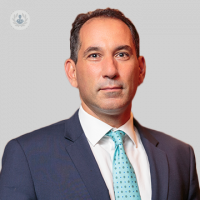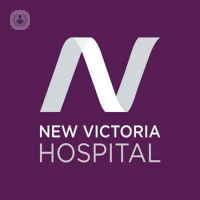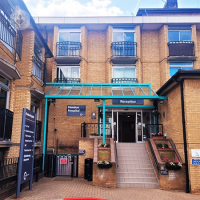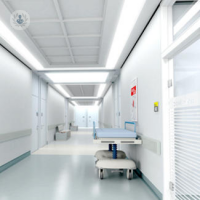What is coeliac disease?
Coeliac disease is a pathology characterised by permanent intolerance to gluten. This substance is present in wheat, barley, rye and oats. Gluten damages the lining of the small intestine, causing it not to absorb the necessary components of the food, i.e nutrients. It occurs in genetically predisposed individuals who suffer from atrophy of the villi of the small intestine.
The disease can manifest itself at any time of life, from infancy to adulthood. People with family members who suffer from coeliac disease have a greater predisposition to suffer from it. It occurs more often in women than in men.
What are the symptoms?
Depending on the degree of intolerance, there may be only a few symptoms which present, or a great many. It is also possible that no symptoms present.
The most common manifestations of coeliac disease are:
- abdominal pain
- gas
- indigestion
- constipation
- decreased or increased appetite
- diarrhoea
- nausea or vomiting
- unexplained weight loss.
Other problems may also occur such as being more prone to bruising, depression, anxiety, fatigue, delayed growth in children, hair loss, dermatitis, mouth ulcers, nosebleeds, and muscle cramps, and absence of menstrual periods, among others.
Causes of coeliac disease
The exact cause of coeliac disease is unknown. When people with coeliac disease consume foods with gluten, whether or not they are aware of their disease, their immune system causes damage to the villi in the small intestine. This in turn makes the small intestine unable to adequately absorb iron, vitamins and nutrients.
Can it be prevented?
As the cause of coeliac disease is not known, there is no way to prevent its appearance. However, it is important to take into account certain risk factors such as having a family member with this disorder, for early diagnosis and treatment.
What is the treatment?
Coeliac disease cannot be cured. The treatment is to follow a gluten-free diet for life. This helps the symptoms disappear and to heal the villi in the lining of the intestines.
If adequate treatment is not given, certain complications can occur such as autoimmune disorders, bone disease, intestinal cancer, anaemia, or liver disease.
11-13-2012 05-26-2023Coeliac disease
Dr Carlo Nunes - Gastroenterology
Created on: 11-13-2012
Updated on: 05-26-2023
Edited by: Conor Dunworth
What is coeliac disease?
Coeliac disease is a pathology characterised by permanent intolerance to gluten. This substance is present in wheat, barley, rye and oats. Gluten damages the lining of the small intestine, causing it not to absorb the necessary components of the food, i.e nutrients. It occurs in genetically predisposed individuals who suffer from atrophy of the villi of the small intestine.
The disease can manifest itself at any time of life, from infancy to adulthood. People with family members who suffer from coeliac disease have a greater predisposition to suffer from it. It occurs more often in women than in men.
What are the symptoms?
Depending on the degree of intolerance, there may be only a few symptoms which present, or a great many. It is also possible that no symptoms present.
The most common manifestations of coeliac disease are:
- abdominal pain
- gas
- indigestion
- constipation
- decreased or increased appetite
- diarrhoea
- nausea or vomiting
- unexplained weight loss.
Other problems may also occur such as being more prone to bruising, depression, anxiety, fatigue, delayed growth in children, hair loss, dermatitis, mouth ulcers, nosebleeds, and muscle cramps, and absence of menstrual periods, among others.
Causes of coeliac disease
The exact cause of coeliac disease is unknown. When people with coeliac disease consume foods with gluten, whether or not they are aware of their disease, their immune system causes damage to the villi in the small intestine. This in turn makes the small intestine unable to adequately absorb iron, vitamins and nutrients.
Can it be prevented?
As the cause of coeliac disease is not known, there is no way to prevent its appearance. However, it is important to take into account certain risk factors such as having a family member with this disorder, for early diagnosis and treatment.
What is the treatment?
Coeliac disease cannot be cured. The treatment is to follow a gluten-free diet for life. This helps the symptoms disappear and to heal the villi in the lining of the intestines.
If adequate treatment is not given, certain complications can occur such as autoimmune disorders, bone disease, intestinal cancer, anaemia, or liver disease.
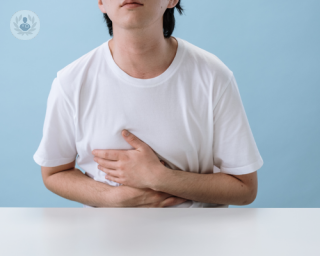

IBS explained: Causes, symptoms and effective treatment options
By Dr Ahmed Albusoda
2025-01-07
Irritable bowel syndrome, or IBS, is a gastrointestinal disorder that affects many people. This article takes a look at the causes, symptoms and treatment options of this condition. See more
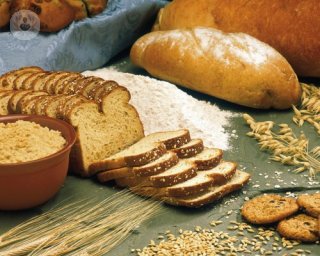

Coeliac disease: symptoms, diagnosis and treatment
By Professor Paul Ciclitira
2025-01-07
Professor Ciclitira discusses coeliac disease (CD), a digestive condition which leaves the body unable to absorb nutrients due to gluten intolerance. It affects 1% of the UK population who need to follow a gluten-free diet. In this article, the symptoms, diagnosis and treatment of CD are explored. See more


IBS symptoms: could they mean something else?
By Dr Lisa Das
2025-01-07
Symptoms aren't always what they seem. Leading consultant gastroenterologist Dr Lisa Das tells us about 4 other conditions to watch out for that share the same symptoms as irritable bowel syndrome. See more


Allergies at Christmas: Hidden risks over the festive period
By Professor George Du Toit
2025-01-07
Christmas is a time for celebration, family gatherings and festive meals. Many families will also be travelling to family and friends or even further away on holidays, all representing new environments which may be associated with an increased risk of allergic symptoms and reactions. Understanding the types of allergies that may be more prevalent during this time can help individuals manage their symptoms and enjoy the holidays to the fullest. See more
Experts in Coeliac disease
-
Professor Christos Toumpanakis
GastroenterologyExpert in:
- Neuroendocrine tumours
- Acid reflux
- Inflammatory bowel disease (IBD)
- Chronic diarrhoea
- Coeliac disease
- Dysphagia
-
Dr Mark Cox
GastroenterologyExpert in:
- Irritable bowel syndrome (IBS)
- Inflammatory bowel disease (IBD)
- Coeliac disease
- Endoscopy
- ERCP
- Liver disease
-
Dr Farooq Rahman
GastroenterologyExpert in:
- Inflammatory bowel disease (IBD)
- Crohn's disease
- Ulcerative colitis
- Irritable bowel syndrome (IBS)
- Colonoscopy
- Coeliac disease
-
Dr Derek Chan
GastroenterologyExpert in:
- Acid reflux
- Inflammatory bowel disease (IBD)
- Abdominal pain
- Irritable bowel syndrome (IBS)
- Coeliac disease
- Crohn's disease
-
Dr Dhamyanthi Thangarajah
Paediatric gastroenterologyExpert in:
- Endoscopy
- Acid reflux
- Infant feeding
- Abdominal pain
- Coeliac disease
- Food allergies
- See all

New Victoria Hospital
New Victoria Hospital
184 Coombe Lane West, Kingston upon Thames, KT2 7EG
No existe teléfono en el centro.
By using the telephone number provided by TOP DOCTORS, you automatically agree to let us use your phone number for statistical and commercial purposes. For further information, read our Privacy Policy
Top Doctors

Hendon Hospital - part of Circle Health Group
Hendon Hospital - part of Circle Health Group
46/50 Sunny Gardens Rd, London NW4 1RP
No existe teléfono en el centro.
By using the telephone number provided by TOP DOCTORS, you automatically agree to let us use your phone number for statistical and commercial purposes. For further information, read our Privacy Policy
Top Doctors

Spire Little Aston Hospital
Spire Little Aston Hospital
Little Aston Hall Drive, Sutton Coldfield, B74 3UP
No existe teléfono en el centro.
By using the telephone number provided by TOP DOCTORS, you automatically agree to let us use your phone number for statistical and commercial purposes. For further information, read our Privacy Policy
Top Doctors
-
New Victoria Hospital
184 Coombe Lane West, Kingston upon Thames, KT2 7EG, South LondonExpert in:
- Cardiology
- General Surgery
- Orthopaedic surgery
- Breast augmentation
- Pain management
- Spine
-
Hendon Hospital - part of Circle Health Group
46/50 Sunny Gardens Rd, London NW4 1RP, North LondonExpert in:
- Cardiology
- General Surgery
- Gastroenterology
- Hand and wrist
- Nutrition and Dietetics
- Foot and ankle
-
Spire Little Aston Hospital
Little Aston Hall Drive, Sutton Coldfield, B74 3UP, Sutton ColdfieldExpert in:
- Bariatric Surgery
- General Surgery
- Orthopaedic surgery
- Robotic Surgery
- Diagnostic Imaging
- Ophthalmology
- See all
- Most viewed diseases, medical tests, and treatments
- Immunotherapy
- Alzheimer's disease
- Child nutrition
- Migraine
- Paediatric rheumatology
- Autoimmune diseases
- Joint pain
- Nutrition
- Weight loss injections
- Endermologie


